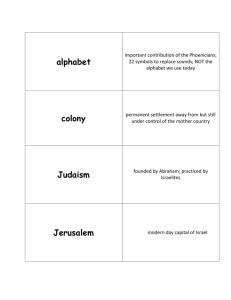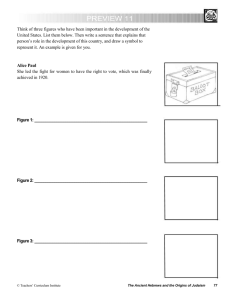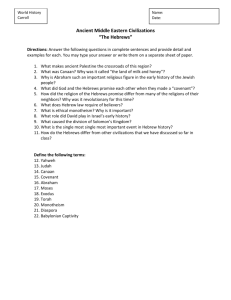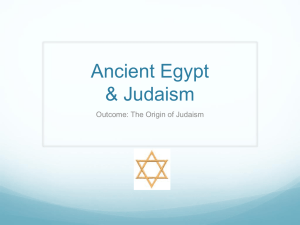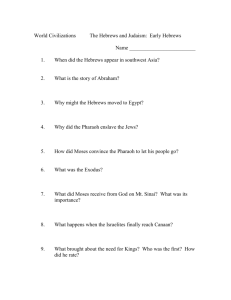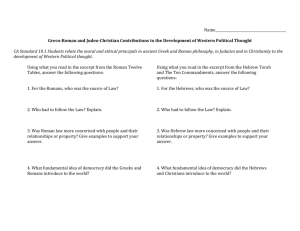File
advertisement
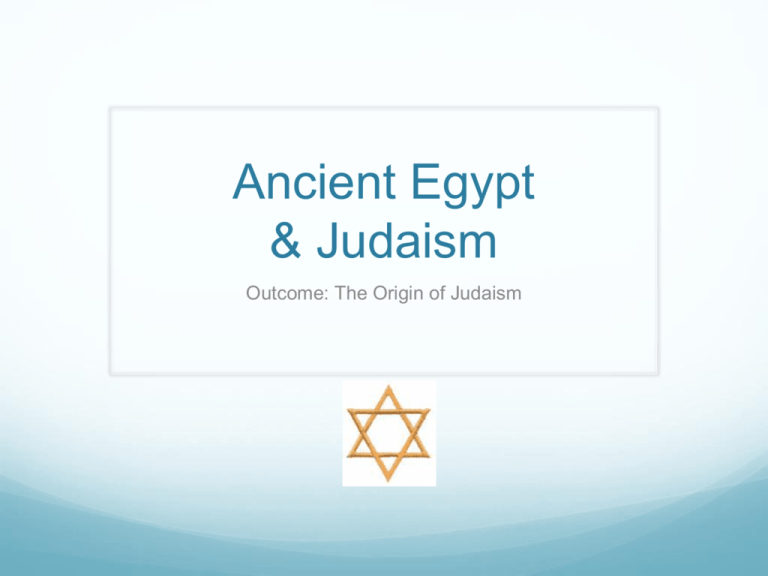
Ancient Egypt & Judaism Outcome: The Origin of Judaism The Origin of Judaism 2. The Search for a Promised Land a. Ancient Palestine’s location made it a crossroads of the ancient world. b. Palestine: Region at the eastern end of the Mediterranean Sea. c. The Hebrews settled in Canaan which was located in Palestine d. According to the Bible, Canaan was the land God had promised to the Hebrews The Origin of Judaism e. Most of what we know of early Hebrew history is found in the first five books of the Hebrew Bible known as the Torah. f. The Torah is the most sacred writings to the Hebrews and make up part of the Old Testament for the Christians g. In the Torah, God chose Abraham to be the “father” of the Hebrew people h. Abraham was a shepherd who lived in Ur; God commanded him to move his people to Canaan around 1800 B.C. i. Around 1650 B.C. the descendents of Abraham moved to Egypt j. The Hebrews were monotheistic and worshipped god Yahweh k. Covenant: Promise made by Abraham and his people to obey Yahweh in return Yahweh had promised to protect Abraham and his descendents The Origin of Judaism 3. Moses and the Exodus a. The Bible says the Hebrews migrated to Egypt due to drought and famine b. At first they were accepted but later were forced into slavery Moses The Origin of Judaism c. Moses i. At the time of Moses’ birth, the Pharaoh felt threatened by the Hebrews and commanded that all first born males be killed ii. iii. Moses’ mother laid him in the reeds of the Nile to save him A Egyptian princess found him and raised him in luxury Baby Moses on the Nile The Origin of Judaism iv. v. vi. vii. He did not forget his Hebrew birth but no one knew including the Pharaoh Eventually Moses’ secret would get out and he became a slave By the command of God he was told to lead the Hebrews out of Egypt This became known as the Exodus; “Let my people go!” Moses Parting the Red Sea The Origin of Judaism viii. As the Hebrews traveled across the Sinai Peninsula, Moses went to the top of Mount Sinai to pray ix. x. The Bible says he spoke to God and was given the Ten Commandments These Ten Commandments and other teachings became the basis of religious law of Judaism as well as Christianity The Ten Commandments… Can you name them?? The Origin of Judaism 4. The Kingdom of Israel a. Canaan was harsh with desert, rocky wilderness, and the hot valley of the Jordan River b. The tribe of Judah was the last remaining of the Hebrews and were soon called the Jews with their religion Judaism c. The Hebrews united under one kingdom of Israel d. Israel as an official country would not be formed until 1948 e. Solomon became the most powerful of Hebrew kings and built a trading empire f. He glorified the city of Jerusalem g. Solomon built an important temple in Jerusalem called Solomon's Temple h. The kingdom would divide in two: Israel in the north and Judah in the south The Origin of Judaism 5. The Babylonian Captivity a. Eventually disaster struck: both Israel and Judah had to pay tribute to the Assyrians b. Tribute: peace money paid by a weaker power to a stronger power c. They paid the tribute to avoid being attacked but was not enough d. In 725 B.C. the Assyrians invaded Samaria, the capital of Israel e. By 722 B.C. the whole northern kingdom was under Assyrian control The Origin of Judaism f. The southern kingdom lasted another 150 years before falling to the Babylonians g. The Assyrians had been losing control to Babylonian king Nebuchadnezzar h. Solomon's Temple was destroyed by the Babylonians i. In 539 B.C. Persian King Cyrus the Great took power and allowed many Hebrew exiles to return to Jerusalem to rebuild Solomon's Temple j. Many others would dominate the region including the Persians, Greeks, and the Romans k. Jerusalem is still a very important city for Jews, Christians, and Muslims The Origin of Judaism Result: The history of the Hebrews has been a long and arduous journey. Of the five major religions studied in this class, theirs will be the oldest and one of the most influential. Many of their practices and ideas would cross into many mainstream cultures today.
